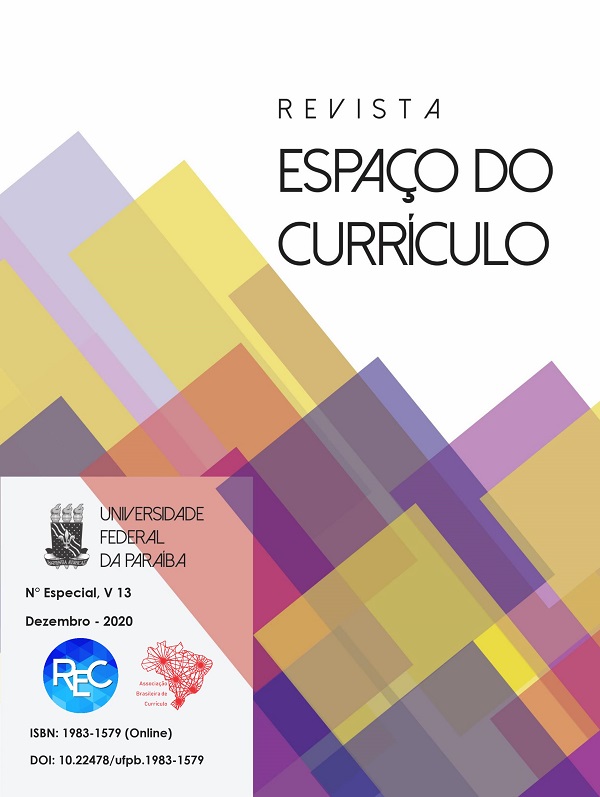RELATIONS BETWEEN CURRICULUM AND KNOWLEDGE FOR CURRICULUM AND CULTURE
some notes on such movements
DOI:
https://doi.org/10.22478/ufpb.1983-1579.2020v13nEspecial.54496Keywords:
Education, Instruction, National Curriculum ParametersAbstract
This is the analysis of the text Inquiries about the curriculum: Curriculum, knowledge and Culture, which is one of the five notebooks organized by the Ministry of Education (MEC) in 2007. The document authored by Antonio Flávio Moreira and Vera Candau, aims, like the other notebooks, to create debates, questions and reflections in the education systems, regarding the conception of curriculum and its developments. In the document analyzed, the authors note that the concern with the curricular issue moved from the relationship between curriculum and knowledge to curriculum and culture. This concern materialized after 1990, where it became the topic of discussion at various conferences developed by international organizations, including the World Bank, which prompts us to ask: What is the concern with the educational curriculum? and what conception of knowledge, culture and curriculum are being defended in this instruction perspective? To respond to these concerns, we use the Historical-Critical Pedagogy as a contribution to the analysis of the conceptions about curriculum, knowledge and culture pointed out in the base text. We emphasize that our defense is based on man's ability to learn to feel, think, evaluate and act, and not simply to adapt to the current system, arguments observed between the lines of these guiding documents.
Downloads
Metrics
References
ARCE, Alessandra. Compre o kit neoliberal para a educação infantil e ganhe grátis os dez passos para se tornar um professor reflexivo. Educação & Sociedade, ano XXII, nº 74, Abril/2001. Disponível em: Acesso em: 20 de abril de 2019. http://www.scielo.br/pdf/es/v22n74/a14v2274.pdf.
CAVALHEIRO, Caroline Battistello; TEIVE, Gladys Mary Ghizoni. Movimento escolanovista - três olhares. XI Congresso Nacional de Educação – EDUCERE. Pontifícia Universidade Católica do Paraná – PUC-PR. Curitiba: PR, 23 à 26 de setembro de 2013. Disponível em: https://educere.bruc.com.br/arquivo/pdf2013/7135_4344.pdf. Acesso em: 15 de abril de 2020.
DELORS, Jacques. Educação: um tesouro a descobrir. Relatório para a UNESCO da Comissão Internacional sobre Educação para o século XXI. São Paulo: Cortez, 1998. Disponível em: http://dhnet.org.br/dados/relatorios/a_pdf/r_unesco_educ_tesouro_descobrir.pdf. Acesso em: 24 de abril de 2019.
GASPARIN, João Luiz; PETENUCCI, Maria Cristina. Pedagogia Histórico Crítica: Da teoria à prática no contexto escolar. Semana Pedagógica - Núcleo Regional de Educação, Paraná: PR, 2014. Disponível em: http://www.diaadiaeducacao.pr.gov.br/portals/pde/arquivos/2289-8.pdf. Acesso em: 21 de abril de 2019.
GHIRALDELLI JR, Paulo. Entre modernidade e pós-modernidade. Revista Viver Mente & Cérebro. Coleção Memória da Pedagogia, nº 6: educação no século XIX: perspectivas e tendências. RJ: Relume Dumar: Ediouro; São Paulo: Segmento-Duetto, 2006, p.22-29.
KASPCHAK, Marilene; GASPARIN, João Luiz. A Pedagogia Histórico-Crítica como instrumento de planejamento docente-discente. XI Jornada do HISTEDBR, 2011. Disponível em: http://www.histedbr.fe.unicamp.br/acer_histedbr/jornada/jornada11/artigos/5/artigo_simposio_5_500_marilenekaspchak@hotmail.com.pdf. Acesso em: 22 de abril de 2019.
LIBÂNEO, José Carlos. Políticas educacionais no Brasil: desfiguramento da escola e do conhecimento escolar. Cadernos de Pesquisa, v. 46, n. 159, p.38-62, 2016. Disponível em: http://www.scielo.br/pdf/cp/v46n159/1980-5314-cp-46-159-00038.pdf. Acesso em: 17 de abril de 2019.
MORAES, Maria Célia Marcondes de. O recuo da teoria. In: MORAES, M. C. M. (Org) Iluminismo às avessas: produção de conhecimento e políticas de formação docente. Rio de Janeiro: DP&A, 2003, p.151-167.
MOREIRA, Antônio Flávio Barbosa. Currículo, conhecimento e trabalho: uma trajetória e algumas reflexões. Trabalho apresentado na 14ª Reunião Anual da ANPEd, São Paulo, 1991.
MOREIRA, Antônio Flávio Barbosa. Conhecimento, currículo e ensino: questões e perspectivas. Conferência apresentada no 1º Congresso de Ciências Humanas, Letras e Artes de Minas Gerais. Em Aberto. Brasília, ano 12. n.58, abr./jun. 1993. Disponível em: http://rbep.inep.gov.br/index.php/emaberto/article/viewFile/1890/1861. Acesso em: 21 de abril de 2019.
MOREIRA, Antônio Flávio Barbosa; CANDAU, Vera. Indagações sobre currículo: currículo, conhecimento e cultura. Orgs.: Janete Beauchamp, Sandra Denise Pagel, Aricélia Ribeiro do Nascimento. – Brasília: DF. Ministério da Educação, Secretaria de Educação Básica, 2007. Disponível em: http://portal.mec.gov.br/seb//arquivos/pdf/Ensfund/indag3.pdf. Acesso em: 19 de abril de 2019.
SAVIANI, Demerval. História das ideias pedagógicas no Brasil. Campinas: SP, Autores Associados, 2007.
SAVIANI, Demerval. Pedagogia Histórico-Crítica: primeiras aproximações. 10 ed. Ver. – Campinas: SP, Autores Associados, 2008.
SAVIANI, Demerval. Educação escolar, currículo e sociedade: o problema da Base Nacional Comum Curricular. Revista Movimento, Ano 3, Nº 4, Universidade Federal Fluminense, 2016. Disponível em: http://www.revistamovimento.uff.br/index.php/revistamovimento/article/view/296. Acesso em: 20 de abril de 2019.
SILVA, Tomaz Tadeu da. Documentos de identidade: uma introdução às teorias do currículo. 3ª ed. – 1ª reimp. - Belo Horizonte: Autêntica, 2010. 156 p.
YOUNG, Michael. Para que servem as escolas? Educ. Soc., Campinas, vol.28, n. 101, p.1287-1302, set./dez. 2007. Disponível em: http://www.cedes.unicamp.br. Acesso em: 24 de abril de 2019.
YOUNG, Michael. Por que o conhecimento é importante para as escolas do século XXI? Revista Cadernos de Pesquisa, v. 46, n. 159, p.28-37, 2016. Disponível em: http://www.scielo.br/pdf/cp/v46n159/1980-5314-cp-46-159-00018.pdf. Acesso em: 21 de abril de 2019.
Downloads
Published
How to Cite
Issue
Section
License
Copyright (c) 2020 Curriculum Space Journal

This work is licensed under a Creative Commons Attribution 4.0 International License.
By submitting an article to Curriculum Space Journal (CSJ) and having it approved, the authors agree to assign, without remuneration, the following rights to Curriculum Space Journal: first publication rights and permission for CSJ to redistribute this article. article and its metadata to the indexing and reference services that its editors deem appropriate.
















